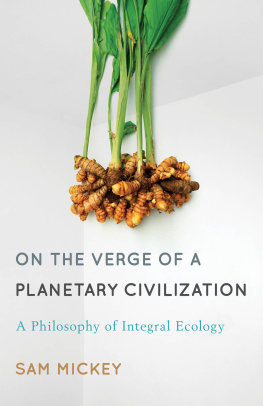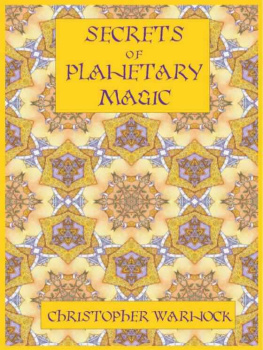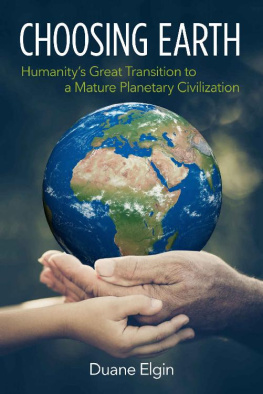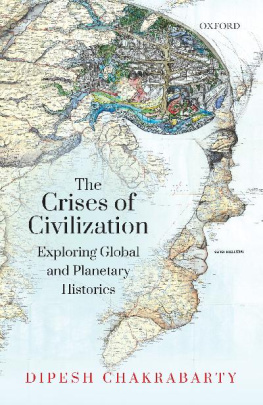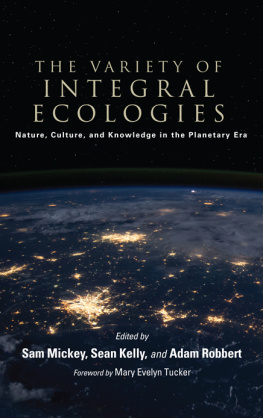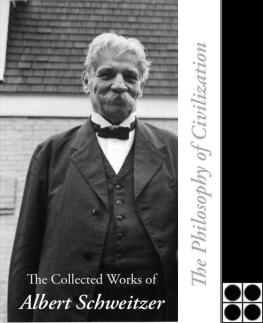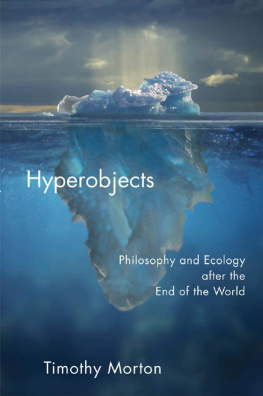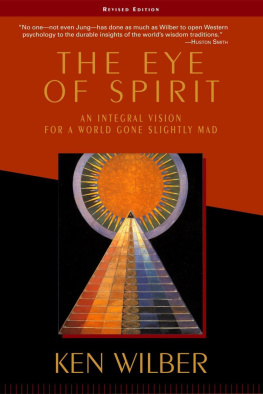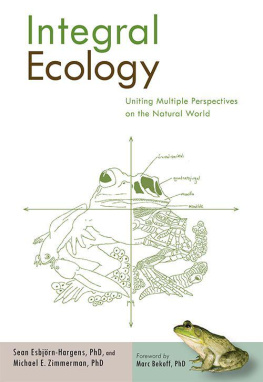Mickey - On the Verge of a Planetary Civilization: A Philosophy of Integral Ecology
Here you can read online Mickey - On the Verge of a Planetary Civilization: A Philosophy of Integral Ecology full text of the book (entire story) in english for free. Download pdf and epub, get meaning, cover and reviews about this ebook. year: 2012, publisher: Rowman & Littlefield Publishers, genre: Romance novel. Description of the work, (preface) as well as reviews are available. Best literature library LitArk.com created for fans of good reading and offers a wide selection of genres:
Romance novel
Science fiction
Adventure
Detective
Science
History
Home and family
Prose
Art
Politics
Computer
Non-fiction
Religion
Business
Children
Humor
Choose a favorite category and find really read worthwhile books. Enjoy immersion in the world of imagination, feel the emotions of the characters or learn something new for yourself, make an fascinating discovery.
- Book:On the Verge of a Planetary Civilization: A Philosophy of Integral Ecology
- Author:
- Publisher:Rowman & Littlefield Publishers
- Genre:
- Year:2012
- Rating:5 / 5
- Favourites:Add to favourites
- Your mark:
- 100
- 1
- 2
- 3
- 4
- 5
On the Verge of a Planetary Civilization: A Philosophy of Integral Ecology: summary, description and annotation
We offer to read an annotation, description, summary or preface (depends on what the author of the book "On the Verge of a Planetary Civilization: A Philosophy of Integral Ecology" wrote himself). If you haven't found the necessary information about the book — write in the comments, we will try to find it.
Mickey: author's other books
Who wrote On the Verge of a Planetary Civilization: A Philosophy of Integral Ecology? Find out the surname, the name of the author of the book and a list of all author's works by series.
On the Verge of a Planetary Civilization: A Philosophy of Integral Ecology — read online for free the complete book (whole text) full work
Below is the text of the book, divided by pages. System saving the place of the last page read, allows you to conveniently read the book "On the Verge of a Planetary Civilization: A Philosophy of Integral Ecology" online for free, without having to search again every time where you left off. Put a bookmark, and you can go to the page where you finished reading at any time.
Font size:
Interval:
Bookmark:
On the Verge of a
Planetary Civilization
On the Verge of a
Planetary Civilization
A Philosophy of Integral Ecology
Sam Mickey

London New York
Published by Rowman & Littlefield International, Ltd.
16 Carlisle Street, London, W1D 3BT
www.rowmaninternational.com
Rowman & Littlefield International, Ltd. is an affiliate of Rowman &
Littlefield
4501 Forbes Boulevard, Suite 200, Lanham, Maryland 20706, USA
With additional offices in Boulder, New York, Toronto (Canada), and Plymouth (UK)
www.rowman.com
Copyright 2014 by Sam Mickey
All rights reserved. No part of this book may be reproduced in any form or by any electronic or mechanical means, including information storage and retrieval systems, without written permission from the publisher, except by a reviewer who may quote passages in a review.
British Library Cataloguing in Publication Information Available
A catalogue record for this book is available from the British Library
ISBN: HB 978-1-7834-8136-1
PB 978-1-7834-8137-8
EB 978-1-7834-8138-5
Library of Congress Cataloging-in-Publication Data
Mickey, Sam, 1981
On the verge of a planetary civilization : a philosophy of integral ecology / Sam Mickey.
pages cm
Includes bibliographical references and index.
ISBN 978-1-78348-136-1 (cloth : alk. paper)ISBN 978-1-78348-137-8 (pbk. : alk. paper)ISBN 978-1-78348-138-5 (electronic)
1. Deleuze, Gilles, 19251995. 2. EcologyPhilosophy. I. Title.
B2430.D454M53 2014
194dc23
2014017957
 TM The paper used in this publication meets the minimum requirements of American National Standard for Information Sciences Permanence of Paper for Printed Library Materials, ANSI/NISO Z39.48-1992.
TM The paper used in this publication meets the minimum requirements of American National Standard for Information Sciences Permanence of Paper for Printed Library Materials, ANSI/NISO Z39.48-1992.
Printed in the United States of America
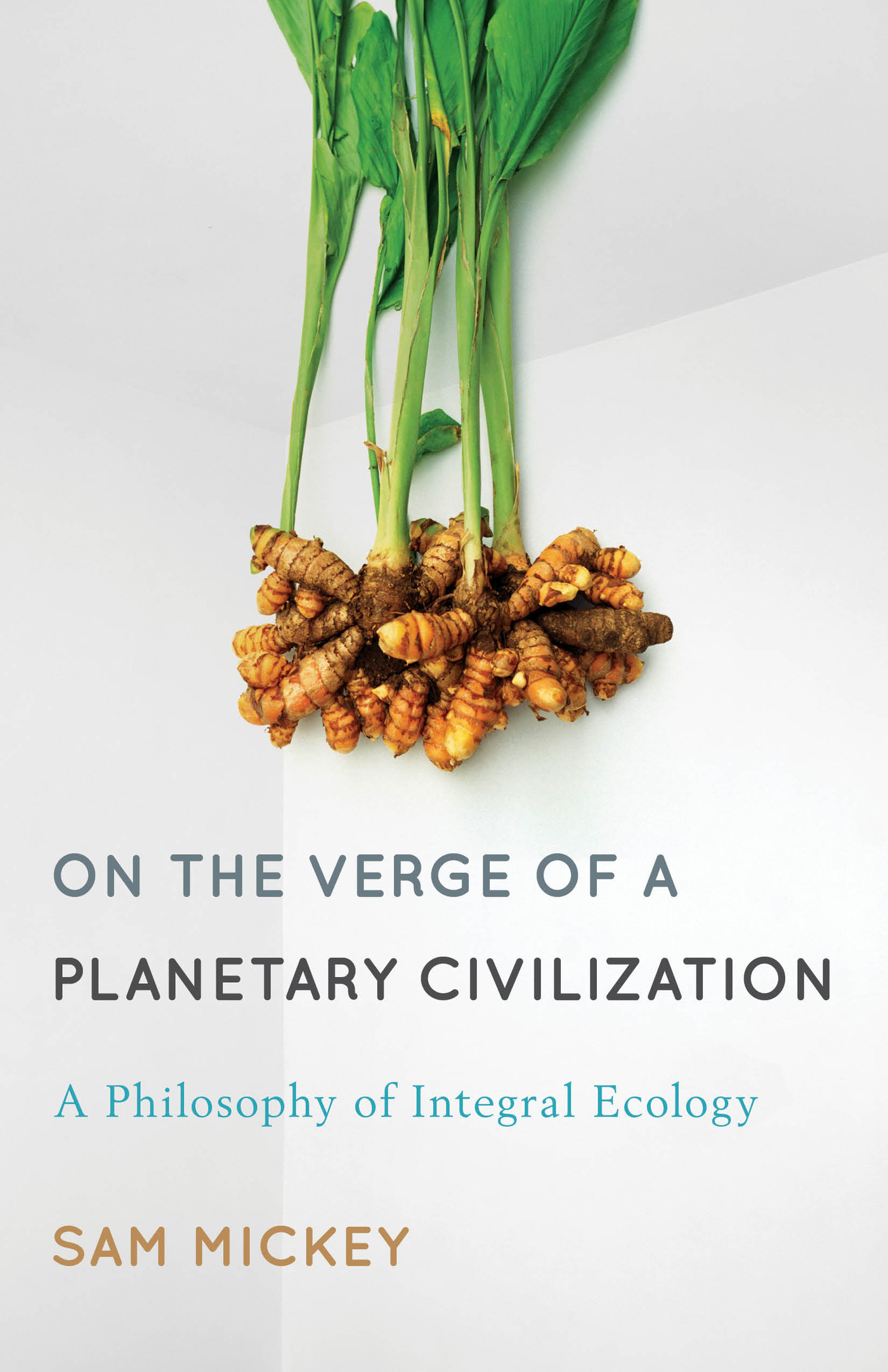
Philosophy is a joint effort. This book would not be possible without support and collaboration provided by so many who have shared in the loving struggle of philosophy with me. Firstly, writing a work on ecological and planetary issues, I have been continually reminded that I live on a planet. It is a wondrous and humbling reminder of the immense support granted to me by water, plants, respiration, sunlight, bacteria, soil, gravity, and innumerable other features of existence on Earth. Regarding institutional support, I am grateful to faculty, students, and staff at the University of San Francisco, Pacifica Graduate Institute, Dominican University of California, and the California Institute of Integral Studies, and I am grateful to Sarah Campbell and everyone at Rowman & Littlefield International. I am also indebted to everyone involved with the Forum on Religion and Ecology at Yale, with particular thanks to the directors of the Forum, Mary Evelyn Tucker and John Grim, two living examples of integral ecologists. I cannot forget George James, Irene Klaver, and Keith Wayne Brown, without whom I would never have found my way to phenomenology. I am still learning from them and from the other environmental philosophers at the University of North Texas. Much appreciation goes to Sean Kelly, Brian Swimme, and Catherine Keller for their encouraging guidance and for their extensive comments on earlier drafts of this work. Many thanks go to Sean Esbjrn-Hargens for supporting my work with integral studies and welcoming my participation in conferences and publications on that topic. Many dear friends have wandered with me along the meandering path of the geophilosophy of Deleuze and Guattari. Along those lines, Adam Robbert, Whitney Bauman, Elizabeth McAnally, and Luke Higgins all deserve special thanks for reading, writing, and talking with me. Extra special thanks go to Kimberly Carfore for her love, partnership, and intellectual solidarity throughout the writing and publication of this work. I want to express deep gratitude to all those who have nurtured me and supported this work, all those nearest and dearest to me, my family, friends, loved ones, and so many others who have been my companions and coconspiratorstoo many others to name, multiplicities of multiplicities folded together in the chaosmos.
This book presents philosophical contributions to integral ecologyan emerging approach to ecology that crosses the disciplinary boundaries of the humanities and sciences (natural and social) with the aim of responding to the increasingly complex and perplexing ecological problems pervading the planet. A book, according to Gilles Deleuze, is not worth much on its own, but can respond to a desire only in a political way, outside the book. Like any book, this book of integral ecological philosophy finds its real value in its response to what happens outside its pages, in the connections the book makes with other people, with other problems and questions. This book is an invitation to make those connectionsto experiment to make something happen to respond to your desires. Can the book respond to a desire for a comprehensive understanding of ecological problems? Can it respond to a desire for a more peaceful and just tomorrow for humans and for all the beings composing our planetary home, our oikos? The answer is simple. Experiment.
This book allies itself with the philosophy of Gilles Deleuze (19251995) and some of his colleagues and successors, particularly those who, like Deleuze, consider the task of philosophy to be an experimental effort to forge new connections, to create something and become different. Deleuze and his writing partner Flix Guattari express this sense of philosophy when they say, Philosophy is the discipline that involves creating concepts.
For thinkers like Deleuze and Derrida, philosophy is not just about talking or debating. Neither is it primarily a matter of thinking or reflecting. It is creative, inventive, or it is nothing at all. A philosophers task is to facilitate the emergence of new events, new realities. Along these lines, the contemporary philosopher Graham Harman mentions that the creation of concepts proposed by Deleuze and Guattari is not just a creation of thoughts or images in human consciousness. Concepts are independent forces traversing and apportioning reality, such that philosophy is not simply a creation of intellectual ideas but is also a creation of independent forces, which is to say, a creation of objects or integralunits.
Philosophers create concepts, and these concepts are not simply representations in human minds. They are events, objects, occasions. One can participate in them by following clues and decoding signs that express strange, unknown, and mysterious things. Along these lines, Deleuze says that a philosophy book should be like a detective novel or science fiction book, which is not to say that philosophical writing should be fiction as opposed to fact, but that it should intervene in and resolve local situations (problems not unlike the murders, thefts, time travel, aliens, and artificial intelligences of detective and sci-fi situations). A concept is a specific event resolving specific problems, ranging from small-scale problems (e.g., a jewel heist or an intelligent robot) to large-scale problems (e.g., alien invasions and intergalactic politics) in the entangled temporalities (e.g., time travels) of presents, pasts, and futures.
Next pageFont size:
Interval:
Bookmark:
Similar books «On the Verge of a Planetary Civilization: A Philosophy of Integral Ecology»
Look at similar books to On the Verge of a Planetary Civilization: A Philosophy of Integral Ecology. We have selected literature similar in name and meaning in the hope of providing readers with more options to find new, interesting, not yet read works.
Discussion, reviews of the book On the Verge of a Planetary Civilization: A Philosophy of Integral Ecology and just readers' own opinions. Leave your comments, write what you think about the work, its meaning or the main characters. Specify what exactly you liked and what you didn't like, and why you think so.

